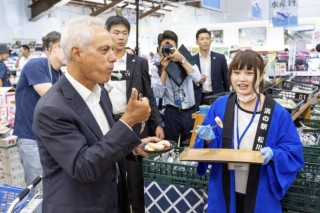Loading
Search
▼ U.S. Envoy Visits Fukushima To Eat Fish, Criticize China’s Seafood Ban Over Wastewater Release
- Category:Other
The U.S. ambassador to Japan visited a city in Fukushima on Thursday and had a seafood lunch with the mayor, talked to fishermen and stocked up on local produce to show they are safe after the release of treated radioactive wastewater from the wrecked Fukushima nuclear plant into the sea, backing Japan while criticizing China’s ban on Japanese seafood as political.
Ambassador Rahm Emanuel ate flounder and sea bass sashimi with Soma Mayor Hidekiyo Tachiya, talked with local fishermen, and visited a grocery store where he sampled fruits and bought peaches, figs, grapes, flounder, sea bass and other produce from Fukushima prefecture.
All of his purchases will be served when his children visit him this weekend, Emanuel said in a telephone interview from his train back to Tokyo. “We are going to all eat it. As a father, if I thought if there is a problem, I won’t serve it.”
The release of the treated wastewater began last week and is expected to continue for decades. Japanese fishing groups and neighboring countries oppose it, and China immediately banned all imports of Japanese seafood in response.
Emanuel praised Japan’s water release plan as scientifically based and fully transparent, which he said “stands in total contrast” to how China handled the coronavirus pandemic.
“The Chinese ban is political,” he said. An end to the ban “depends on whether China wants to be a good neighbor,” Emanuel said.
Radioactive wastewater has accumulated at the Fukushima plant since a massive earthquake and tsunami in 2011 destroyed cooling systems and caused meltdowns in three reactors. The 1.34 million tons of water is stored in about 1,000 tanks and continues to grow because of leaks and the use of cooling water.
The government and the plant operator say discharging the water into the sea is unavoidable because the storage tanks will reach their capacity early next year and space at the plant will be needed for its decommissioning, which is expected to take decades.
Earlier Thursday, Japanese Prime Minister Fumio Kishida sampled seafood and talked to workers at Tokyo’s Toyosu fish market to assess the impact of China’s ban on Japanese seafood.
One of the seafood business operators told Kishida that sales of his scallops, which are largely exported to China, have dropped 90% since the start of the wastewater discharge.
Kishida told reporters that he instructed officials to compile a package of support measures for seafood exporters hit by China’s import ban, including an expansion of domestic consumption and new destinations for Japanese seafood to replace China.
“We will patiently and resolutely call on China to take actions based on scientific evidence,” Kishida said.
The government has allocated 80 billion yen ($550 million) to support fisheries and seafood processing and combat potential damage to the reputation of Japanese products.
The government will do everything to protect the fisheries industry by utilizing the fund and other measures, Kishida said, indicating possible additional financial measures.
China stepped up testing of Japanese fisheries products, causing long delays at customs, even before the start of the wastewater release and the Chinese import ban. Japanese Fisheries Agency officials said the measure has affected prices and sales of seafood from places as far away from Fukushima as Hokkaido.
All seawater and fish sampling data since the release have been way below set safety limits for radioactivity, officials and the plant operator, Tokyo Electric Power Company Holdings, say.
In Seoul on Thursday, South Korean President Yoon Suk Yeol visited a fish market and had seafood for his lunch as part of efforts to ease public concerns about the safety of local fishery products after Japan’s wastewater release, as his country strengthens a trilateral strategic partnership with Japan and the United States in the face of a growing Chinese regional threat.
Chief Cabinet Secretary Hirokazu Matsuno hinted on Wednesday of the possibility of taking the case to the World Trade Organization, but Foreign Minister Yoshimasa Hayashi stressed the importance of dialogue.
The impact of China’s ban on Japanese seafood has spilled over to tourism. Transport and Tourism Minister Tetsuo Saito says cancellations of Chinese group tours and inquiries about food safety in Japan have been on the rise.
Meanwhile, Kishida ordered Agriculture, Forestry and Fisheries MInister Tetsuro Nomura to apologize after calling the treated radioactive water “contaminated,” the term China uses.
Nomura used the term when speaking to reporters after meeting with Kishida and other ministers to discuss fisheries support measures. He apologized and retracted the remark, which Kishida called “extremely regrettable.”
- September 1, 2023
- Comment (0)
- Trackback(0)


